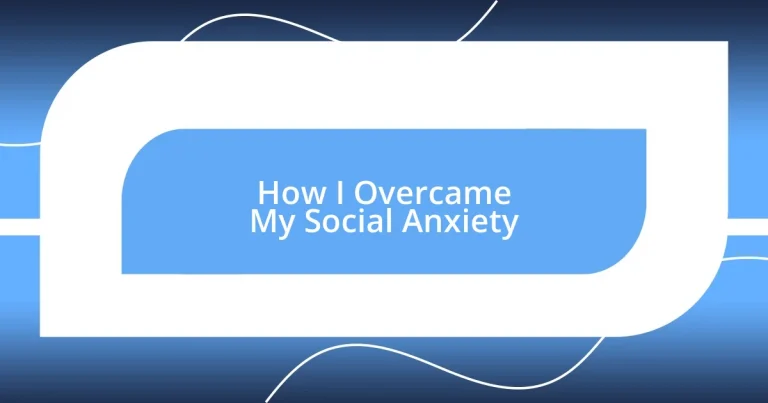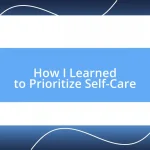Key takeaways:
- Identifying triggers of social anxiety, such as large gatherings and public speaking, helps regain a sense of control and develop coping strategies.
- Implementing coping strategies like breathing techniques, positive affirmations, and gradual exposure builds confidence and reduces anxiety over time.
- Celebrating small wins and maintaining a support network fosters resilience, reinforces a positive mindset, and encourages continued progress in overcoming anxiety.
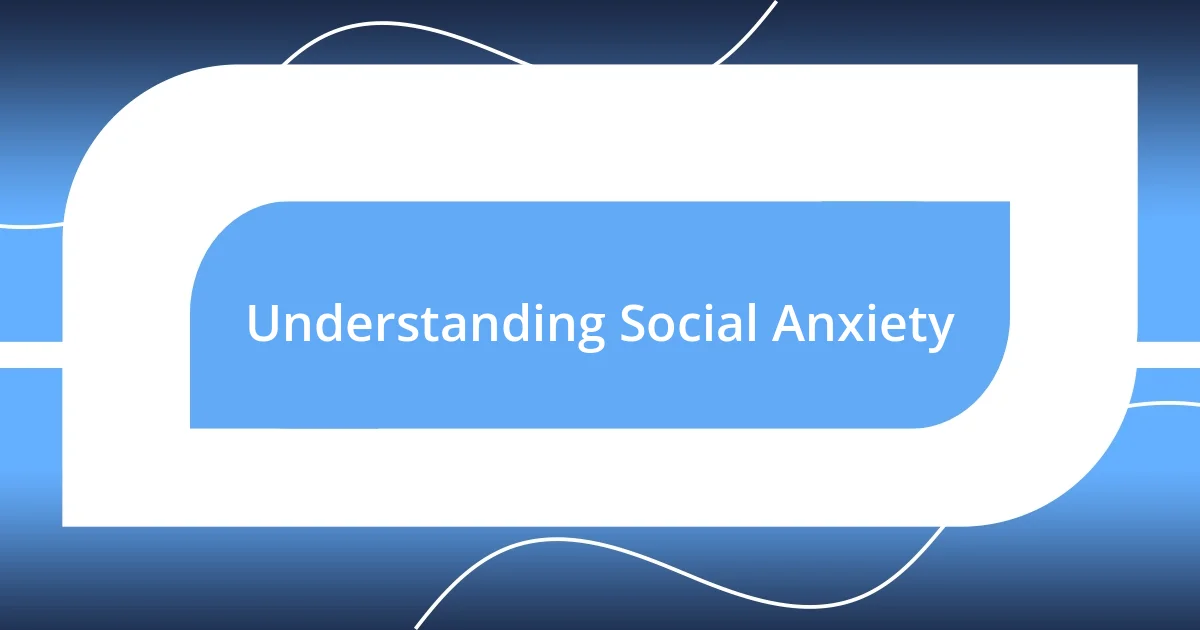
Understanding Social Anxiety
Social anxiety is more than just shyness; it can feel like a heavy blanket that stifles your every move. I remember standing in a crowded café, my heart racing and palms sweating, convinced that everyone was watching my every action. Have you ever felt that way, like the room dims around you and the walls close in?
At its core, social anxiety often stems from fears of negative evaluation or embarrassment in social settings. I can vividly recall an experience where I stumbled over my words during a simple introduction; the ensuing silence felt like an eternity, deepening my sense of isolation. It makes you wonder, why do we hold ourselves to such impossible standards?
Understanding this anxiety is crucial for breaking free from its grip. Often, it feels like an invisible barrier, one that distorts reality and creates a whirlwind of negative thoughts. I’ve had times where I questioned my worth based solely on a perceived mistake, which only reinforced my anxiety. Have you ever caught yourself in a spiral of “what ifs”? Acknowledging these feelings is the first step toward overcoming the powerful hold of social anxiety.
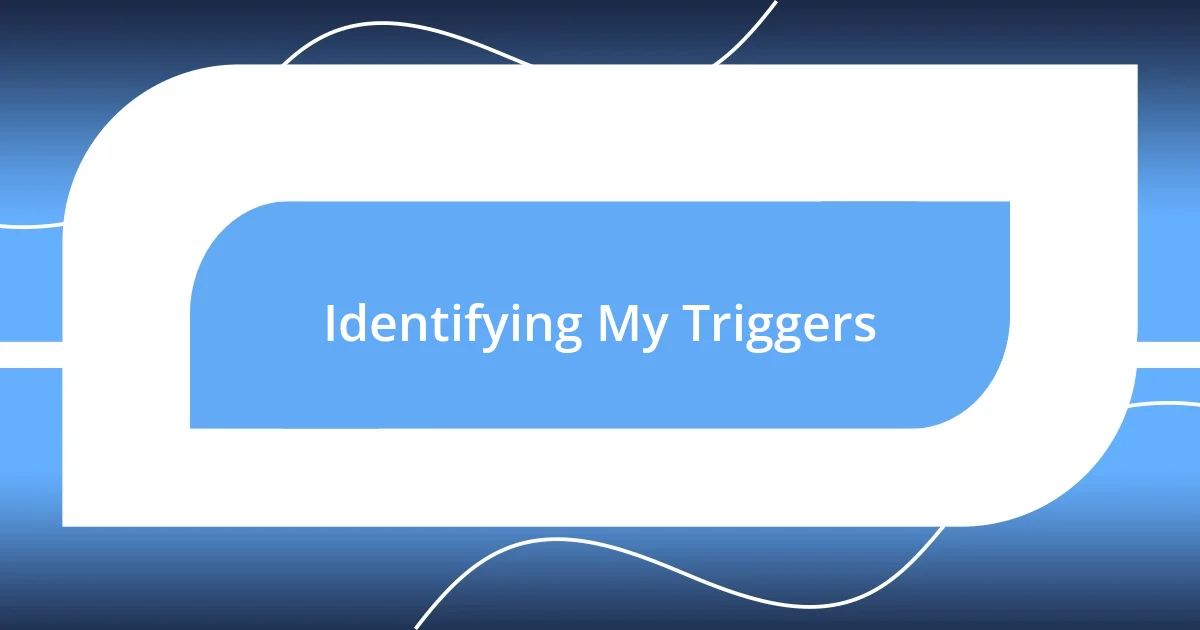
Identifying My Triggers
Identifying my triggers was one of the most eye-opening experiences in my journey with social anxiety. I found that specific situations consistently increased my anxiety, leading me to recognize patterns in my behavior. For instance, every time I was invited to a gathering where I didn’t know many people, I could feel the tightness in my chest before I even arrived. This awareness empowered me to plan better strategies, like bringing a friend along or giving myself an exit plan, which made a big difference.
To pinpoint my triggers, I paid attention to what affected me most. Here are some of the common situations that would send my anxiety into overdrive:
- Large social gatherings: The sheer number of people could be overwhelming.
- Public speaking: Just the thought of being in the spotlight made my heart race.
- Meeting new people: I often felt scrutinized during introductions.
- Unexpected changes in plans: I craved predictability, and surprises would throw me off balance.
- Social media interactions: The pressure to present myself a certain way online created anxiety.
By identifying these triggers, I felt a sense of control returning to my life, which is an empowering feeling when battling social anxiety.
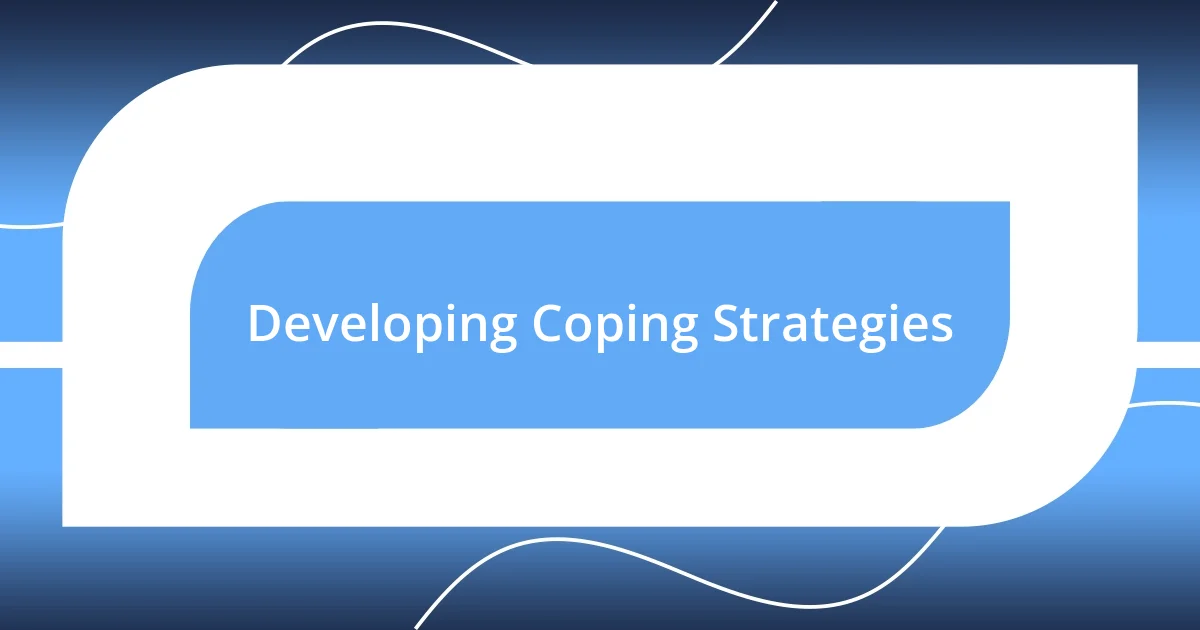
Developing Coping Strategies
Developing coping strategies was a pivotal moment in my battle with social anxiety. I started experimenting with breathing techniques, realizing how something as simple as taking deep breaths could ground me in moments of panic. For instance, there were times when I was about to enter a social situation and felt that familiar surge of anxiety. I would pause for a few minutes, inhale, hold, and exhale—focusing on my breath helped me regain control over my thoughts. Have you tried this? You might be surprised at how effective it can be.
In addition to breathing exercises, I found that practicing positive affirmations made a huge difference in shifting my mindset. By repeating statements like “I am capable” or “I am enough,” I slowly rewired my negative self-talk. I remember staring at my reflection in the mirror before an event, reciting these affirmations and feeling a spark of confidence build within me. This simple practice allowed me to face social situations with a more positive attitude. It’s interesting how the way we talk to ourselves can genuinely change our experience.
Finally, I learned the value of gradual exposure. Instead of diving headfirst into a large gathering, I began by attending smaller events first. I vividly recall my first attempt at this; I started by inviting a close friend over for coffee, where I felt safe and in control. Little by little, I expanded my comfort zone. This strategic approach allowed my confidence to grow without overwhelming me. It’s remarkable how baby steps can lead to substantial progress in managing social anxiety.
| Coping Strategy | Description |
|---|---|
| Breathing Techniques | Simple exercises to calm the mind and regain control during panic moments. |
| Positive Affirmations | Speaking positive phrases to counter negative self-talk and build confidence. |
| Gradual Exposure | Incrementally facing anxiety-inducing situations to reduce overwhelm. |

Gradual Exposure Techniques
Gradual exposure techniques transformed my journey with social anxiety in ways I never expected. I remember starting this process by simply stepping outside my comfort zone, which at first felt daunting. One of my initial steps involved going to a local café during less busy hours, just to get used to being around others without the pressure of interacting. It was like dipping my toes into the water before plunging in; each visit built my confidence just a bit more.
As I gradually faced bolder situations, I encountered setbacks that challenged my resolve. There was one evening when I decided to attend a friend’s birthday party. While I was anxious, I reminded myself of all the smaller victories I had achieved. Noting how I had spoken to three new acquaintances and even shared a laugh helped me realize that each experience, regardless of how it felt, was part of my growth. Have you ever celebrated small wins? This practice can be surprisingly uplifting amidst the struggle.
I also found that keeping a journal throughout this process was invaluable. Writing about each exposure experience helped me clarify my thoughts and feelings. I could reflect on moments when I felt proud of myself or analyze situations where I grew anxious. This habit allowed me to track my progress, reaffirming that gradual exposure was not just about facing fears but also about understanding my emotional journey. Looking back now, I see how each step, big or small, was a building block toward greater resilience.
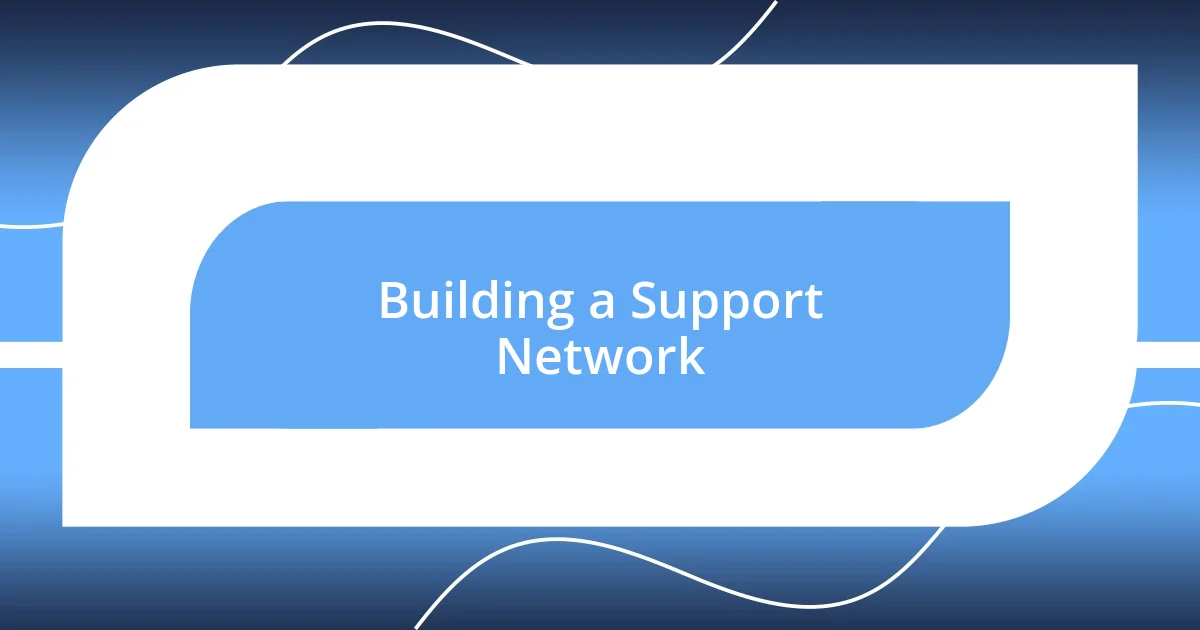
Building a Support Network
Building a support network was a game changer for me in overcoming social anxiety. I’ll never forget the moment when I decided to reach out to a few trusted friends and share my struggles. Their understanding made me feel less alone, and it opened up a space where I could express my fears without judgment. Have you ever shared something personal with a friend and felt that immediate relief? It’s truly liberating.
As I continued on this journey, I also discovered the value of joining communities that focused on personal growth. I attended support groups where members openly discussed their own experiences with anxiety. These gatherings transformed anxiety from a source of shame into a shared experience, allowing me to see that others were navigating similar waters. I remember the first time I spoke up in one of those sessions; the warm smiles and nods of support from others filled me with a sense of belonging that was uplifting.
Additionally, I realized how vital it was to surround myself with people who encouraged me. Instead of focusing on individuals who drained my energy or perpetuated my fears, I sought relationships that nurtured my confidence. For example, finding a friend who would join me for social outings made a huge difference. I recall a particularly challenging event where my friend stood by my side, providing quiet support as we navigated conversations together. It’s amazing how having the right people in your corner can ignite a spark of courage you didn’t know you had!
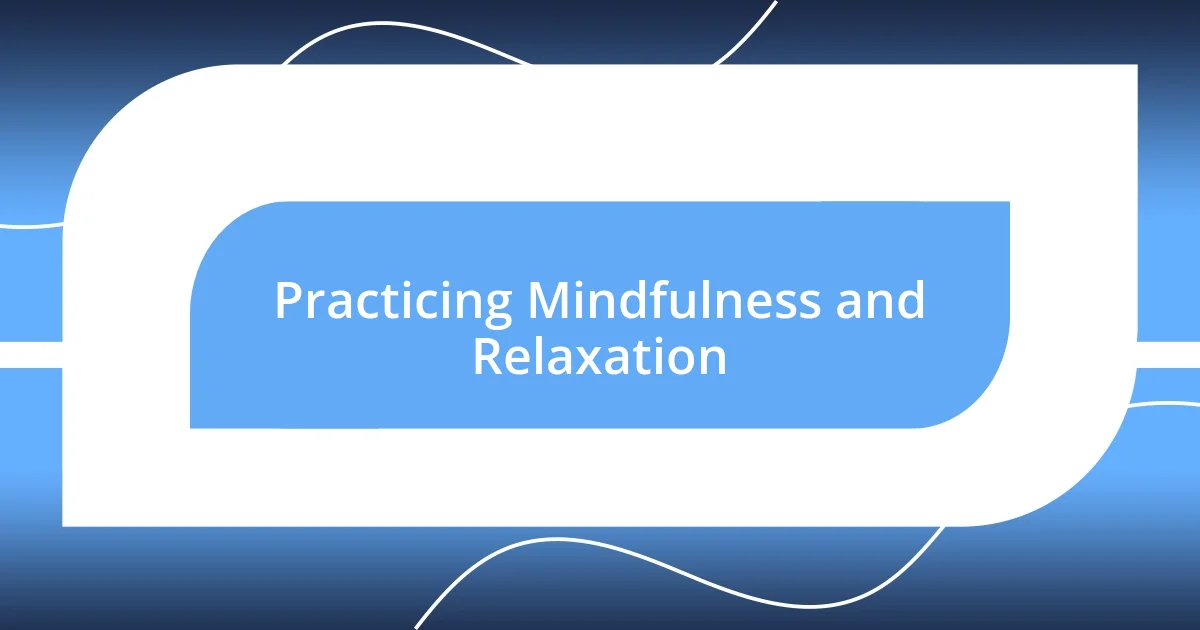
Practicing Mindfulness and Relaxation
Practicing mindfulness was a significant element in my journey to manage social anxiety. I started by incorporating short meditation sessions into my daily routine, focusing on my breath. At first, it felt strange to sit in silence, but as I continued, I discovered how grounding it was to simply observe my thoughts without judgment. Have you ever taken a moment just to breathe? This practice helped me recognize that my anxious thoughts didn’t define me; they were just passing clouds in the sky of my mind.
In moments of high anxiety, I turned to progressive muscle relaxation, which taught me the power of physical awareness. I vividly remember a situation where I was about to speak in front of a small group. Instead of succumbing to panic, I took a few minutes to tense and then release each muscle group in my body while focusing on my breathing. That simple act transformed the tightness in my chest into a calm presence, allowing me to express myself without the underlying fear. It’s incredible how connecting with my body can shift my mental state.
Embracing these mindfulness techniques brought a new layer of clarity to my life, like removing the fog from a once-blurry perspective. Engaging in activities such as mindful walking in nature made me feel connected to the world around me. During one of these walks, I stopped to watch the leaves rustle in the wind and realized how beautiful it was to simply be present. It’s moments like these that remind me of the importance of grounding myself, which is essential when tackling social situations. How often do we rush through life without noticing the beauty around us? For me, each mindful moment became a step towards conquering my anxiety.
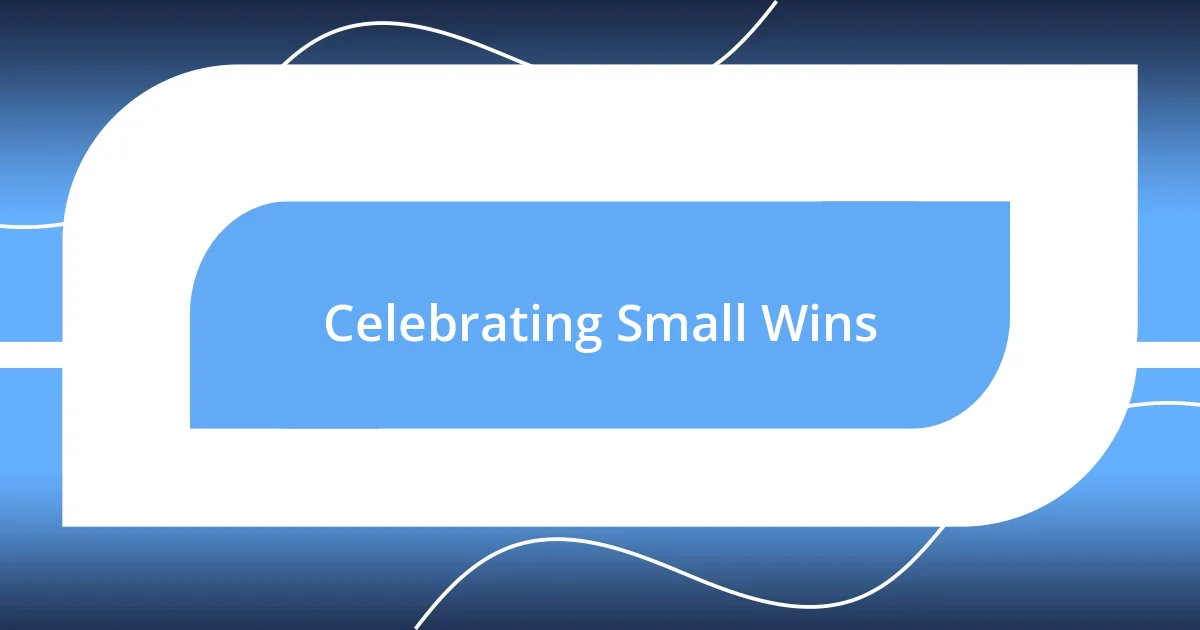
Celebrating Small Wins
Celebrating small wins was crucial in my journey to manage social anxiety. I distinctly remember the rush of excitement after initiating a conversation with someone new. It was just a simple exchange about the weather, but the thrill of stepping out of my comfort zone made it feel monumental. Have you ever experienced a moment that seemed trivial but felt like a giant leap forward? Those small interactions gradually built my confidence, and I learned to recognize each one as a meaningful victory.
Looking back, I often reflect on how important it was to acknowledge these little milestones. For instance, I created a journal where I documented every success, no matter how small. Whether it was attending a social gathering or simply making eye contact during a chat, writing it down made those moments tangible. In doing so, I cultivated a habit of gratitude and positivity that shifted my perspective. Have you ever captured a good moment in writing? It’s like giving yourself a little reminder of your progress.
Celebrating these wins not only motivated me but also reinforced a positive mindset. I started to internalize the idea that each step, even the tiniest one, was part of my broader journey toward overcoming anxiety. The more I acknowledged and celebrated these successes, the easier it became to push through challenges. It was as if each small win lit a spark within me, reminding me that I was capable of pushing beyond my limits. So, I ask you, how will you celebrate your progress today?












